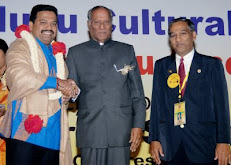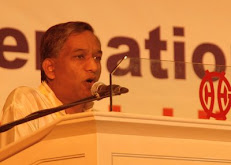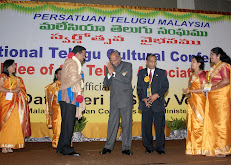Teach the Telugu language to non-Telugus
Andhra University in charge Vice-Chancellor S.V. Sudhakar has asked the Telugu Department of the university to teach Telugu to those from other States and working in public sector units to spread the language.
He was speaking on Wednesday at the inauguration of a two-day national seminar organised on “Telugu marga-desi literature” to mark the superannuation of Pallikonda Apada Rao, a professor in the department.
Prof. Sudhakar recalled that a few decades back the department used to conduct classes for foreigners to enable them to learn Telugu. It should be revived and teaching the language should be taken up to those belonging to other States and in public sector units. But it should suit their convenience and be held on their premises. Speaking of government support, he said in Tamil Nadu, bodies for promoting Tamil were formed at district and mandal-level as well.
He said Dr. B.R. Ambedkar University at Srikakulam (of which he is Vice-Chancellor) had started a course in Telugu this year and admitted students and all seats were filled up. Teaching associates have been recruited.
He recalled his decades-old association with Prof. Apada Rao right from his research days. Former AU Telugu Head of the Department E. Viswanatha Reddy who presided said he was teaching Telugu to personnel of Customs and Central Excise Department and earlier it was taken up for four years in the Steel Plant.
Former Telugu Professor of Bangalore University Tangirala Venkata Subba Rao who delivered the keynote address on marga (classical) and desi (popular) literature said the two found mention in Valmiki's Ramayana some 6,000 years ago when Lava and Kusa, Lord Rama's twin sons, first narrated the epic in desi and then in marga when Rama asked them to do so. Marga and desi could exist in the same language too. For instance the Vedas were in marga and the other epics and kavyas in desi, though both are in Sanskrit. In Telugu, Nannaya's works are in marga while Palkuriki Somanatha's works are in desi. Prabandhas, kavyas etc fall in the classical category while folk forms are in the popular form. In Telugu film songs, Kosaraju's lyrics are desi while Sri Sri and others wrote in marga.
Telugu Head of the Department G. Yohanbabu said the department had made it a practice to organise seminars when members retired. Such programmes were conducted at other times too, he said, thanking the University for its Support
Talk:Silvia Huntsman
1 hour ago



.jpg)
.jpg)
.jpg)
.jpg)
.jpg)


No comments:
Post a Comment